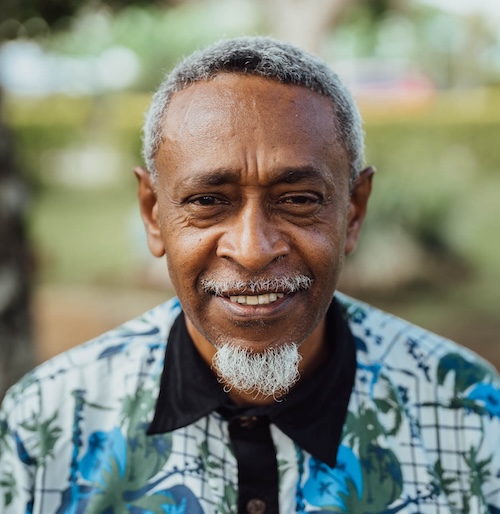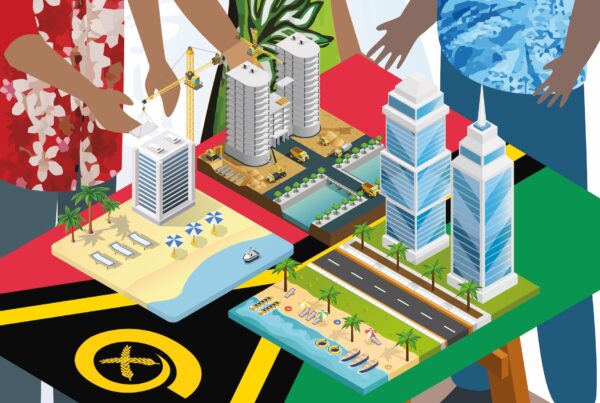By Henry Tamashiro
Vanuatu’s best and brightest shouldn’t have to go abroad to develop advanced skills or to build high-profile careers. They can thrive locally and help develop our country if we bring in foreign experts to train them and investors to offer them jobs. Often, they’re one and the same.
We’ve seen the same story play out time and time again in families across our community. Every time a student shows promise, the only way for them to reach their full potential is to go seek educational and employment opportunities outside the country. It’s not that they want to leave Vanuatu, but they usually have very little choice.
Besides agriculture, tourism, government and our budding financial industry, the opportunities for local talent is limited. STEM graduates in particular (science, technology, engineering, mathematics) are some of the most sought-after and well-paid recruits in the global private sector, but there are few jobs and even fewer high salaries for them in Vanuatu.
Brain gain there, brain drain here
Our most talented youth have two choices: settling for jobs here that don’t match their capabilities or leaving for Australia or even further, which means long absences from their families. On the bright side, they often send money home to loved ones, which adds to the consumer spending portion of our GDP. However, their labour helps grow the economy of another country, producing cumulative value for businesses and driving lasting wealth creation there. Their broader economic contribution is sadly lost to Vanuatu – a phenomenon commonly referred to as the “brain drain.”
When they return, they might build a nice house and retire comfortably, which is good for them and their immediate community, but that won’t create any more local opportunity for their children than when they started, so it’s back to square one for the next cohort of talented youth. They either downsize their dreams or go abroad. Either way, Vanuatu’s brainpower is wasted or exported to another country. Either way, they don’t build anything here, which perpetuates our economic stagnation and dependence on foreign aid.
Most Ni-Vanuatu graduates would love nothing more than to pursue a career in their own country, even if they earned degrees abroad. Until now, the only options we’ve offered them are agriculture, tourism, government and a small services sector. Diversification and jobs in a wider range of fields is the key to retaining our youth.
Embracing the knowledge economy
The question is, what would those fields be? Vanuatu famously lacks the natural resources, manufacturing capacity and geo-strategic location to develop its primary and secondary sectors much further. And what little activity we have is plagued by frequent natural disasters. Our best chance for diversification is in the tertiary sector, especially those services that only require an education and an internet connection, known as knowledge industries.
One such avenue with enormous potential for Vanuatu is fintech. It’s a borderless global industry where players compete based solely on intellectual skills to serve an ever-growing, highly lucrative market. All the tools needed to operate a fintech business are available online and everyone in the ecosystem – clients, suppliers, partners, subcontractors – is just one click away. Plus it’s totally green and virtually immune to natural disasters.
Vanuatu has been constantly working to secure a future in the global fintech industry. Before we could freely participate in the industry, we had to adhere to stringent standards set by global regulatory bodies. Our legislators, in collaboration with enforcement agencies and other stakeholders, spent several years painstakingly overhauling the regulatory framework for Vanuatu’s financial industry. Now we now have a compliant, mature fintech sector that’s ready to take on the world.
We’re off to a great start
Today, 60 global businesses have obtained financial dealer licences (FDL) under the new regime, opened offices on our shores and started hiring staff locally. As their representatives testified at a recent industry symposium, staffing is still an issue, but they’re willing to invest in training. Slowly, but surely, their headcount is growing and the local talent pool is expanding, so it’s only a matter of time before we have a thriving, self-perpetuating workforce with a majority of Ni-Vanuatu training other Ni-Vanuatu.
Soon, a new homegrown, world-class industry will be thriving. Some insiders cite other low-resource island nations with fintech sectors that have skyrocketed in the past few years: Cyprus, Singapore, Bermuda and the Cayman Islands. We’re starting to see inklings of a similar success story here in Vanuatu. And the key players at this stage of the story are the foreign investors and experts who started their businesses when local skills were completely unavailable.
From brain drain to brain gain
As the fintech example details, the knowledge economy attracts a new type of Foreign Direct Investment (FDI). It’s not a pure financial injection but it often comes hand in hand with the importation of highly skilled and/or educated workers.
These new investors use knowledge rather than physical power for their means of production. Instead of purchasing heavy equipment or building large facilities, they invest in human capital. But they must do so in two steps: first, by importing foreign talent to fill the gaps in the local market, then by training as many Ni-Vanuatu as possible to eventually make up the main workforce.
This is the classic chicken and egg dilemma: how can we build previously non-existent businesses if none of us know how to operate them? The answer is the same for every country: we need to transfer skills from abroad. And the easiest way to do that is to invite foreign experts to create the first rung of the ladder, then teach local workers to create and climb the next rungs.
The first to take the training opportunities would likely be the same promising youth who otherwise would go overseas to realize their potential. This makes FDI in the knowledge industry both a plug for our brain drain and a source of brain gain. Once we retain and develop our own talent, we can diversify our economy and increase our country’s wealth. That translates into improved health, education, life expectancy and cultural autonomy for our people.
Since the knowledge economy isn’t constrained by the material world, it puts Vanuatu on a level playing field with the rest of the planet (as long as we have an internet connection). After all, our youth have as much inherent talent and promise as any other country. After a good basic education, it only takes a spark to give them a boost. And that spark comes from foreign experts and investors.
Vanuatu doesn’t have much choice: it either takes the path of the knowledge economy or it remains a poor, developing nation for decades to come. Unless we stop this vicious cycle, our best and brightest will continue to leave to the benefit of more prosperous countries.
Clone what’s working
Attracting foreign talent is a key strategic strength for rich countries like Australia, Canada, the U.S. and Singapore. Vanuatu showed it can play that card when it developed the FDL program and it’s really starting to bear fruit.
Now that we’ve seen how well this works with fintech, let’s do the same with software development; mechanical engineering; design and architecture; sales and marketing or any other high-value pursuit foreign expert investors can bring to our country. Let’s give them everything they need to succeed and we’ll eventually reap the rewards: a diversified, prosperous economy with a highly-skilled, multi-disciplinary workforce.
For too many years, talent has flooded out of our country because we couldn’t leverage their skills locally. In the foreseeable future, economic migrants will become the minority among Ni-Vanuatu graduates, most who will build their careers at home, close to their loved ones. And they will help their country grow.
Get business-friendly fast
To fulfil that vision, we need to make Vanuatu as attractive as we can to expert investors, foreign talent and an educated, skilled workforce. We’re not the only ones to court them. We’re competing with the world for their financial and intellectual capital. So we need to make their experience as positive and seamless as possible.
It starts by adopting an open-border policy for all business travelers, whether they have a project in mind for Vanuatu, they’re doing preliminary exploration or they’re digital nomads roaming the world with their laptops. All of these people are potential investors who have access to a global network of experts. The more who feel welcome, the more opportunities we’ll cultivate for collaboration and cross-pollinating ideas.
In practical terms, this could mean granting automatic business visas upon arrival (as we already do for tourism) and possibly residency visas for longer stays. We could also join the APEC Business Travel Card scheme or work on setting up our own business visa exemption scheme with Australia, Fiji, New Caledonia, New Zealand, the Solomon Islands and others in the region.
There are many ways to move forward so the many stakeholders must be involved in discussions about labour, immigration and/or investment, from government agencies to the private sector. If we share a vision of our prosperous future, we’ll find a way to move forward together. So let’s step up for Vanuatu’s youth: they’ll soon be the driving force of our knowledge economy.

Henry Tamashiro is a human resources and migration consultant and the project lead and government liaison in the Ministry of Internal Affairs’ review of Vanuatu’s Citizenship-by-Investment scheme. He previously served in public office as Director of the Department of Immigration and Passport Services and as Principal Passport Officer. A noted specialist in “training trainers,” Mr. Tamashiro is passionate about translating policy into meaningful contributions that transform and better society. He has been instrumental in improving Vanuatu’s migration framework with a focus on the nation’s economic and social development.





